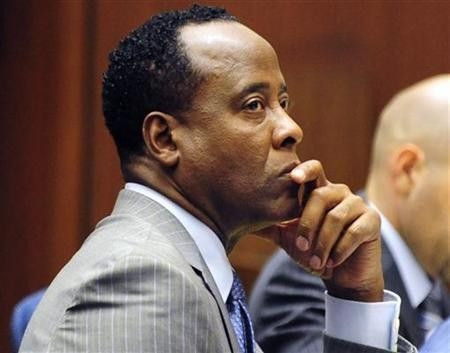Propofol Infusion Dominates Jackson Doctor's Trial

A top medical expert offered damaging testimony against Michael Jackson's former doctor on Thursday, calling one defense theory a crazy scenario and offering a dramatic look at how the drug that killed the pop star could have been infused into his body.
The testimony of Dr. Steven Shafer, an expert on the drug propofol that is seen as the chief cause of the singer's death, left defendant Dr. Conrad Murray looking exasperated as he sat in the courtroom.
It came as prosecutors were poised to wrap up their involuntary manslaughter case against Murray.
Murray has admitted that on June 25, 2009 -- the day Jackson died -- he injected the singer with propofol as a sleep aid but has pleaded not guilty to being responsible for his death.
In prior testimony, jurors have heard several doctors slam Murray for administering propofol by himself in a home when the powerful anesthetic is normally used for surgery in a medical facility full of monitoring and emergency equipment.
Shafer demonstrated on Thursday how Murray could have used a clumsy but deadly IV infusion of propofol to administer the drug into a vein in Jackson's leg to help him sleep.
Jurors watched as the pure white propofol Jackson called his milk flowed down an IV tube and mixed with saline fluid, then emptied into a bottle that represented the singer's body.
Shafer said it was essential for the anesthetic to drip at a set rate and testified that Murray wrongly did not have a pump to control the flow. He is responsible for every drop of propofol in that room, Shafer told jurors.
Murray watched, wide-eyed and exasperated. After the demonstration, he slumped to one side of his chair with his hand at his mouth and a resigned look on his face.
DEFENSE TO RESPOND
Shafer is the final witness called by prosecutors. Murray's defense attorneys are expected to cross-examine him on Friday, then begin calling their own witnesses to the stand.
In his second full day on the stand, Shafer also undercut defense theories that Jackson could have given himself propofol and the anti-anxiety drug lorazepam and caused his own death.
Shafer said the 50-year-old Thriller singer would have had to inject himself several times with propofol, each time falling in and out of consciousness, to achieve a cumulative rise of the drug in his bloodstream.
People don't wake up ... hellbent to give themselves another dose, Shafer said. It's a crazy scenario.
He used charts to argue the most likely scenario to explain the level of propofol found in Jackson's bloodstream at autopsy is that Murray had him on an intravenous drip of the drug when the singer went into cardiac arrest.
Before that moment, the propofol caused Jackson to stop breathing with Murray failing to keep watch over the singer, Shafer said. He added that had Murray paid attention, he could have saved Jackson.
He could easily have just turned off the propofol infusion, Shafer said. ... And there would have been no injury to Michael Jackson.
Medical examiners determined Jackson died of an overdose of propofol, with the lorazepam playing a contributing role.
Murray's defense attorneys, in addition to suggesting Jackson self-administered more propofol, have argued the singer could have swallowed more lorazepam than the four milligrams Murray said he infused into the singer.
But Shafer also criticized that theory. He said the amount of actual lorazepam found in Jackson's stomach -- as opposed to the harmless, metabolized form of the drug -- was minuscule.
Murray faces a maximum four years in prison if convicted.
© Copyright Thomson Reuters 2024. All rights reserved.





















